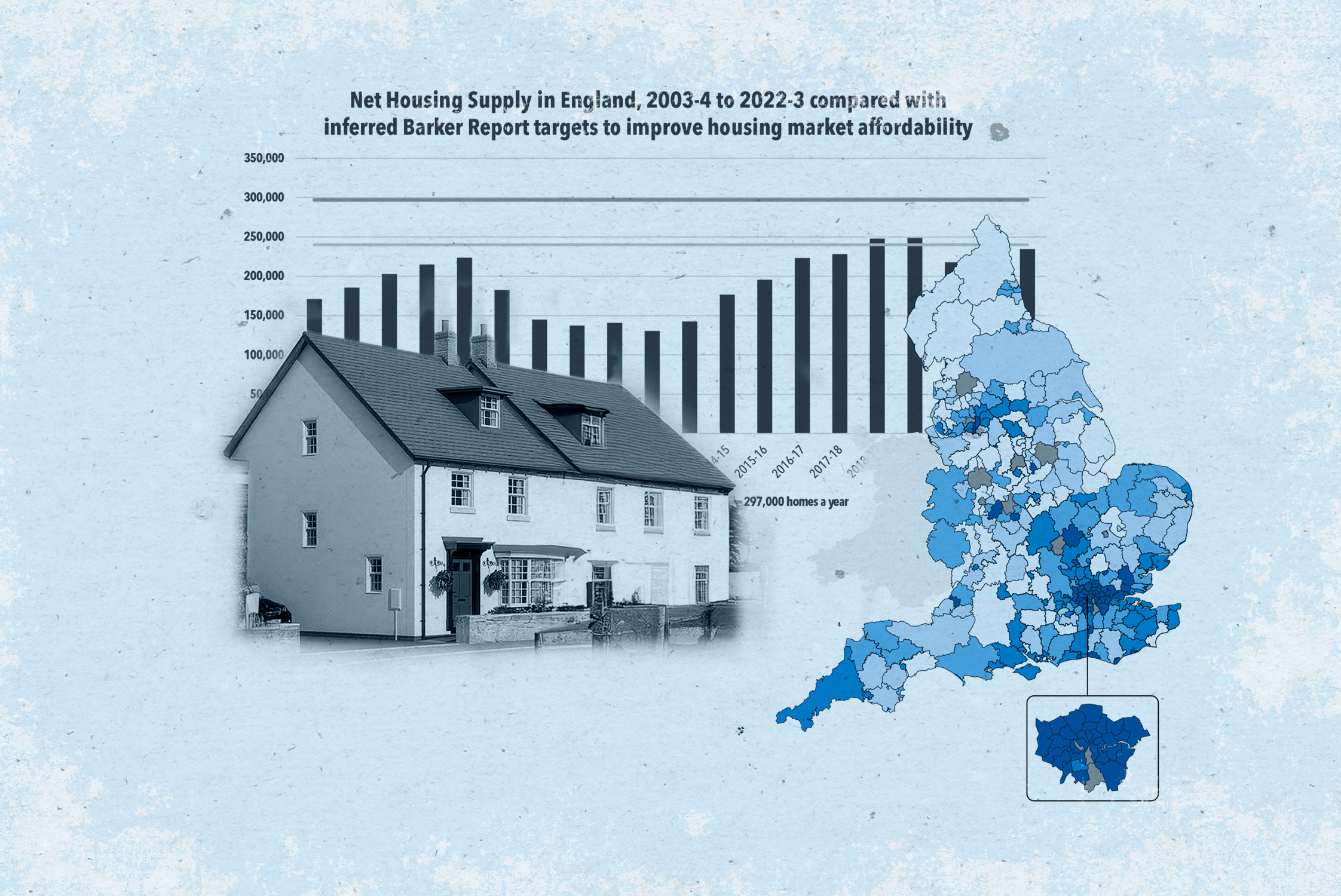You are viewing 1 of your 1 free articles
The Thinkhouse Review: the tension between housing targets and design standards
This month, Kerri Farnsworth looks at reports focusing on planning, design standards and building beautifully
Thinkhouse is a website set up to be repository of housing research. Its editorial panel of economists, chief executives, consultants and academics critiques and collates the best of the most recent housing research (scroll down for more information).
This month was another bumper one for the Thinkhouse editorial panel, with 16 reports to evaluate.
One of the highlights was a report that has already garnered a fair amount of media coverage: A Housing Design Audit for England, authored by the University College London Bartlett School of Planning, the Campaign to Protect Rural England and Place Alliance. The media attention so far has focused on findings that:
- Of the 142 new housing developments reviewed, 75% should not have gone ahead due to ‘mediocre’ or ‘poor’ design
- One in five of these developments should have been refused planning permission outright as their ‘poor’ design was contrary to advice given in the National Planning Policy Framework (NPPF)
- A further 54% should not have been granted permission at all without significant improvements to their design having first been made
However, the report contained other significant findings which have received less attention, but which are just as damning. They also chimed with the findings of other reports we have reviewed this month:
- House builders are capable of creating good-quality housing development in England, as the majority had attained audit scores ranging from ‘good’ to ‘poor’ in various locations
- This variance in design quality was not due to viability issues
- It was the developments by the largest house builders that had the greatest variance in quality
I also found the fact that the ‘middle’ of the three performance brackets used in this report was labelled ‘Solidly Mediocre’, a shameful indicator of current performance for a nation which in GDP terms currently sits within the global top 10.
In summary, the Housing Design Audit report concludes that some house builders – especially the larger ones – are simply choosing not to build better-quality housing in England.
And even worse, the report found some evidence that some were using the planning appeals process to force through schemes with the lowest design quality.
“The Housing Design Audit report concludes that some house builders – especially the larger ones – are simply choosing not to build better-quality housing in England”
So how is the English planning system being used to enable what appear to be repeated obvious departures from the NPPF? The clues lie in the report’s recommendations, for which there are three sets for each of the three key stakeholders in delivery of housing: housing developers, local authorities and central government.
The report asks for housing developers to invest in improved skills and quality standards within in-house design teams and ‘ethical design leadership’ (especially from the big market players); a more comprehensive and community-level approach to measuring resident satisfaction; and an end to the opacity of the economics of housing design quality.
Local authorities are recommended to use independent design reviews (of which the author has positive experience and on both sides of the fence) for housing development of a significant scale or impact; to have closer integration between planning and highways functions; and to have the courage to refuse applications which don’t meet local design guidelines.
“The competing – and sometimes contradictory – demands of meeting housing allocation targets and maintaining design standards are already a challenge”
It’s this latter point that seems to crux of the matter.
At a time where resources (and morale) within local authorities are at rock-bottom, the competing – and sometimes contradictory – demands of meeting housing allocation targets and maintaining design standards are already a challenge in an environment where “house builders [which] have little incentive to improve when their designs continue to pass through the planning system… and highways authorities which rarely recognise their role in creating a sense of place for communities”.
This challenge has been made even harder by a lack of continuity at ministerial level, with the 10th housing ministers in the past 10 years just announced (only two of whom have held the role for more than 12 months). It is disappointing that this housing audit only happened at all because the three co-authors were able to assemble partners to work on a voluntary basis (as detailed on page 18 of the report), rather than it being core funded by England’s dedicated housing agency.
The fact that they have produced such a robust, fact-filled, easy-to-read report make it all the more commendable.
The conclusion of another report the panel reviewed this month, the Town and Country Planning Association’s Planning 2020 ‘One Year On’: 21st Century Slums?, is even more trenchant. Twelve months on from the anniversary of the publication of the final Raynsford Planning Review, it concludes: “English planning remains in crisis… with multiple and systemic problems caused by a decade of deregulation and disregard by national politicians... The extraordinary fact that planning in England still manages to achieve so much in this challenging context is a tribute to those who operate it and their tenacity in overcoming the obstacles placed in their way.”
Another report the panel evaluated this month, Living with beauty; promoting health, well-being and sustainable growth by the Building Better, Building Beautiful Commission, comes to similar conclusions to the reports already mentioned. It concludes that England needs to shift from a “vicious development circle” to a “virtuous development circle” (with helpful graphics of each in the report), by implementing a “simpler and predictable regulatory approach to land use planning, under effective democratic control… with a greater role for stewardship and community development models, as well as for smaller firms and self-build rather than a small number of big players”.
Where the report differs is that it concludes that the key first big moves must be made by UK government: for example, shifting planning obligation to “net gain” from “no net harm”; requiring permitted development rights to have minimum design standards; giving Homes England a greater responsibility for design and master planning and requiring use of quality metrics in their corporate performance measuring and procurement activities; and appointing a ‘minister for place’ to provide visibility and leadership of good placemaking.
To me, these changes by central UK government are the key to the issue. Housing developers are comfortable with the planning system as it is and seem to have found a way to resist demands to improve the quality of their products; and many local authorities are struggling to uphold or enforce design quality. Change therefore needs to be be made from the top down.
Whether it happens or not, given the current post-EU new waters everyone is trying to charter, is another question entirely.
Kerri Farnsworth, director, 360° Cityshapers; and member of the Thinkhouse editorial panel
What is Thinkhouse?
Thinkhouse was formally launched in spring 2018, and aims to “provide a single location and summary of the best and most innovative research pieces, policy publications and case studies”.
It specifically looks at reports that propose ways to boost the amount and quality of housing and the economic, social and community issues of not doing this.
The Thinkhouse editorial panel highlights the ‘must-read’ reports, blogs about them and runs the annual Early Career Researcher’s Prize.
The panel includes current and former housing association chief executives, academics, lawyers, economists and consultants. It is chaired by Richard Hyde, chief executive of a business that sells construction hand tools.
Who is on the panel?
Richard Hyde | Chair of Editorial Panel, CEO of HYDE |
Gemma Duggan | Head of Compliance and Performance at Extracare |
Chris Walker | Economist |
Brendan Sarsfield | CEO, Peabody |
Mick Laverty | CEO, Extracare Charitable Trust |
Martin Wheatley | Senior Fellow, Institute for Government, |
Kerri Farnsworth | Founder & MD, Kerri Farnsworth Associates |
Suzanne Benson | Head of Real Estate for the Manchester office of Trowers. |
Burcu Borysik | Policy Manager at Revolving Doors Agency, |
Ken Gibb | Professor in housing economics at the University of Glasgow, Director of CaCHE |
Peter Williams | Departmental Fellow, Department of Land Economy, University of Cambridge |
Brian Robson | Executive Director of Policy and Public Affairs at the Northern Housing Consortium |
Francesca Albanese | Head of Research and Evaluation at Crisis |
Jules Birch | Journalist and blogger |
Susan Emmett | Head of Engagement for Homes England |
Mark Farmer | Founder and CEO Cast Consultancy |
Steve Moseley | Group Director of Governance, Strategy & Communications at L&Q |
Jennifer Rolison | Head of marketing at Aquila Services Group |
Philip Brown | Professor of Housing and Communities at the University of Huddersfield |
Anya Martin | Senior researcher at the National Housing Federation |
Emily Pumford | Policy & strategy advisor, Riverside |
Anthony Breach | Analyst, Centre for Cities |
Shahina Begum | Customer Insight Office, Peabody |













